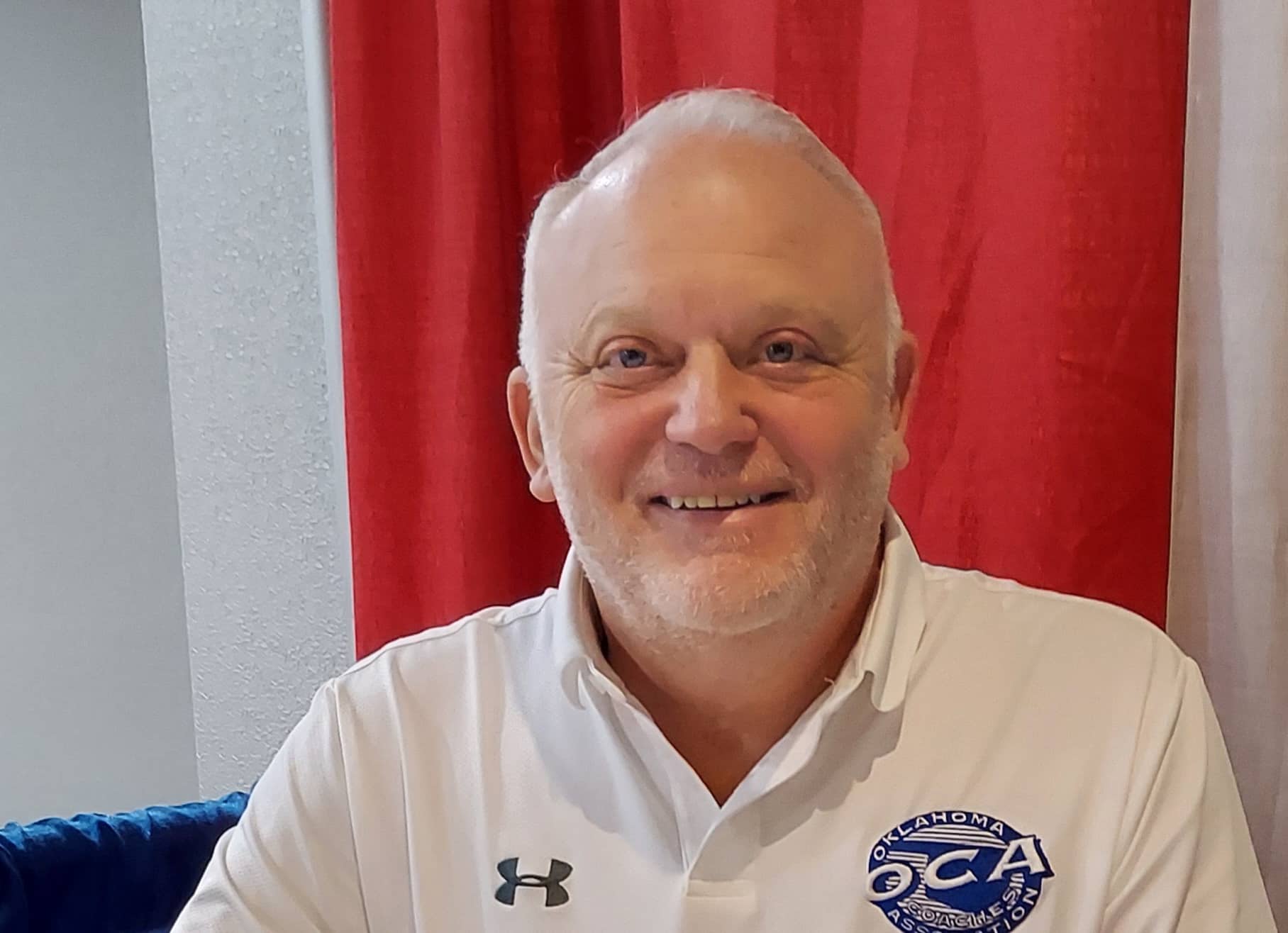By Terrell Lester
Wayne Dozier is a man in motion.
Not a lot of down time for him.
He has things to do. Places to be. People to meet. An organization to run.
In May, he was installed as Executive Director of the Oklahoma Coaches Association.
He has been in a peripatetic mode every day since.
It is a role not for the sedentary.
It is a role Wayne Dozier was born to fill.
He is a study in hustle and bustle.
His thoughts come quickly. His actions quicker.
No shot clock needed.
He is quick to laugh. Quicker to lend a hand.
He coached high school baseball at a championship level. He coached like he was double-parked. He coached two innings, three innings ahead of the game.
Speed-and-power were his bread-and-butter. Speed on the basepaths, team speed, was formula one.
Speed, in the words of Gandhi, is irrelevant if you are going in the wrong direction.
Not a problem for Wayne Dozier. He’s been going in the right direction since he left the family farm near Weatherford some four decades ago.
The deliberate pace, the sometimes solitary, cloistered way of life on the farm, did not mesh with Dozier’s quest for motion.
“I loved the horses and cattle side of it,” he said. “But I wasn’t big into driving a tractor around a field day after day, listening to the radio by myself.
“I like being around people. So, I had to find a job where I could be around people.”
He’s around people now. Some 9,000, in fact.
That’s the membership number of the organization he now heads up at the age of 59.
Following a gilt-edged 32-year coaching career, and a six-year venture into the business world, Dozier landed in the OCA office in May, upon the retirement of longtime director Milt Bassett.
“I love the job,” Dozier said during a rare and brief respite from the hubbub of the OCA clinic in Tulsa.
“It’s a great opportunity. It’s a great job.
“Milt did such a good job for a long time. And he had a system set up.”
Dozier, too, had quite a system set up during his 27 years at Midwest City Carl Albert. He oversaw a baseball program that was a state measuring stick for success.
Under his command (1995-2000, 2005-2015), Carl Albert won five state championships, with another four runner-up finishes.
He finished his work with a record of 563-162.
Impressive as his baseball resume is, that is just a glimpse into the complete Wayne Dozier dossier.
He was a valued assistant on seven championship teams under football coaches Jack Pebworth and Gary Rose. Also, Dozier assisted on five fast-pitch softball title teams and one championship track team.
“I loved working with him,” Rose said of Dozier, who coached running backs.
“I just have a lot of respect for him. I really like him. I think he’ll be really, really good for the OCA.”
Rose went on to list three virtues that define the individuality of Dozier.
“Number one, his organizational skills,” Rose said.
“And his intelligence. He is a brilliant man.
“He is an organized man and he will work.
“Those are the three top things I would say about Wayne Dozier,” Rose said. “And, he has a great sense of humor.”
That lighter side surfaced when Dozier was asked about the 18 gold rings he accumulated while coaching four sports at Carl Albert.
“They are very special,” he said. “Very important to me.
“But it’s hard to be arrogant in my house. My wife (Grace) was the cheer coach (at Carl Albert). She has 19 championships.
“She’s one up.”
In addition to the 13 state golds, Grace also harvested six national championships in National Cheerleaders Association competition.
The Doziers have been married since 1996 and have two sons.
As Wayne was counting the couple’s total number of gold rings, he smiled and cracked: “We should’ve had more kids. And maybe she’d have less championships.”
Gold balls, gold rings. They had little meaning to a young Wayne Dozier growing up on a Custer County farm.
He played sports. All sports. However, an injury ended his competitive range before he even entered Southwestern State.
He put aside game plans and took up business plans.
He pictured himself in the area of agricultural business. Not the tractor-riding part of agriculture. His view would be from an office. From behind a desk.
But just as the wind can change a farmer’s plan, Dozier’s business plan, too, was blown away.
While delving into business theory, his junior high coach, Dennis Seifried, called with a different kind of business offer.
Seifried had a coaching vacancy on his Weatherford junior high football staff.
He did not have to ask twice.
Reacting in the quick manner for which he would eventually be recognized, Dozier accepted.
“I jumped at the opportunity. I changed my major to education. Got into coaching. Never looked back,” he said.
After a moment, he added: “I don’t know why I wanted to go into business. I have no idea.”
He knew the farm business. Knew it firsthand.
“It was frustration every day,” he said. “I could see the frustration on my dad’s face a lot of times.”
He talked about rain and hail wiping out a wheat crop, disease destroying a herd.
Those memories of frustration have never faded for Dozier.
“You know, if we lost a big ball game, it’s still not like losing your livelihood,” he said. “It’s not as devastating as losing a herd of cattle or the best wheat crop you ever had, like my dad did.”
Farming’s loss proved to be coaching’s yield.
While wrapping up his work on a degree at Southwestern, Dozier worked with Seifried in the Weatherford junior high ranks.
“I loved it from the first day,” Dozier said. “It was a great opportunity. I helped out with junior high football, basketball, baseball.
“Coaching was a learning experience at Weatherford. How to respond to players. How to control your temper if you got mad at them. Things that you could say as player to player that you can’t say as coach to player.”
By 1988, Dozier was well on his way down that coaching path. He landed his first full-time job in Guthrie, coaching junior high baseball and football.
Two years later, he stepped up to Carl Albert. And the learning curve continued.
He was assigned to assist in football, slow-pitch softball and baseball. He finally gained his first head-coaching position in 1995 when he was handed the baseball job.
It was a golden move. For school. For Dozier.
For Dozier, it represented the culmination of years of work. Years of learning.
“You learn from other coaches,” he said. “And I learned from my parents.
“I learned how to treat people, and how to look for certain things. That’s one thing you look for when you’re in charge; how to get everyone on the same page.”
Dozier succeeded in getting everyone in his baseball program on the same page. It read like a winner.
He had his team in the state finals at the end of his third year.
“Someone told me once that you really don’t know how good a coach you are until you have good players,” he said.
“A lot of times, the hardest part about being successful is having your players get along. When you have a lot of good players with egos, then you have to really make those egos mesh and work together for a common cause, or the common good.
“Part of the fun of being a head coach is being able to manage those personalities.”
One of those personalities eventually became a Major League Baseball All-Star.
J.T. Realmuto helped win baseball and football championships with Dozier before being selected in the 2010 MLB Draft.
In 2022, Dozier was on hand to watch his former All-American in the World Series as a catcher with the Philadelphia Phillies.
As much as Dozier reveled in the day-to-day business of coaching, of guiding youngsters toward adulthood, he elected to retire in 2015.
In an interview with The Oklahoman at the time, Dozier said: “I was either going to have to cut back on some baseball stuff or get out. The simple fact was I wasn’t going to cut back on anything. I refused to cut back on anything we’ve added to make the baseball team, program as good as we could.”
He returned to the business world that he had rejected as a college student. He hired on with an Oklahoma communications company. And took his coaching philosophy with him.
“The things that I did as a coach, things that I learned as a coach, I brought into that (wireless) industry,” he said.
“You take that experience with you everywhere you go.
“There’s something about coaching that’s invaluable. The experiences that you have, the knowledge, that expertise, those things just apply across the board in any industry.
“People want teachers and people want coaches to come work for them. And that’s why there’s a shortage of teachers and coaches now,” he said.
Success followed Dozier into his newfound field. But there was a void.
“I missed being around coaches,” he said. “Definitely.
“I love coaches. Coaches have been so influential in my life.”
Now he has returned to the coaching fraternity, albeit in an executive role.
When the OCA position was opening, Dozier was ready to grab the reins. The timing was right.
He had been helping the staff with clinic assignments for 30 years. Even while he was out of coaching and working in an unrelated field.
As Gary Rose said: “He’s very energetic. He’s a leader, an organizer, a worker.”
Within the OCA office, Dozier inherited a staff headed by office manager Lea Mouss along with coordinators, and retired coaches, Strippy Biggers, Jerry Havens and Eddie Paul.
“To keep them on the staff as I come on has been a big plus,” Dozier said. “They have so much knowledge of what’s going on.
“When you go into a very successful program, a very successful business, what are you going to change? If you’re successful, you’re not going to change much of anything.
“You’re going to try to retain everyone who’s there and keep that knowledge in place. And then ask them what improvements need to be made and take their suggestions and try to make improvements on that.
“And especially when there’s been such a good running track record of success. With the Coaches Association, you don’t want to change much and disrupt that success that’s been,” he said.
Returning to the OCA office in Oklahoma City after the conclusion of the clinic in Tulsa, Dozier said that his ambition is to “look to the future and start looking for some new ideas and see some things we might want to adjust a little bit.”
He said: “I don’t think there are many major changes that need to be made. But you know, adjustments are always good.”
Possible adjustments might include the production of All-State games during the OCA clinic.
Currently, All-State games are being conducted at widespread locations, from Edmond and Shawnee to Catoosa and Sapulpa.
Bringing all the games, all the athletes back into close proximity, as had been the case since the OCA added basketball (1944) to its football game (1938) to create the foundation for All-State Week, is “definitely something we’d like to do,” Dozier said.
“We have to work out a lot of logistics to make that happen,” he said, mentioning the OCA Board of Directors.
If Dozier has some issues to address, he is not one to dismiss a challenge.
His track record as a coach supports that premise.
He had the golden touch. Knew what strings to pull, what buttons to push.
In his new role, blending his business expertise with his coaching acumen, he is putting together another game plan.
Whatever the situation, he can be expected to produce a solution straight from the Wayne Dozier Playbook. Quickly. And with gold-plated intuition.
(Terrell Lester is a newspaperman who lives in Claremore.)














